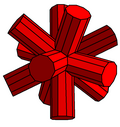小二十面半十二面体
 | ||||
| 类别 | 均匀星形多面体 半多面体 | |||
|---|---|---|---|---|
| 对偶多面体 | 小二十面半无穷星形十二面体 | |||
| 识别 | ||||
| 名称 | 小二十面半十二面体 Small icosihemidodecahedron | |||
| 参考索引 | U49, C63, W89 | |||
| 鲍尔斯缩写 | seihid | |||
| 数学表示法 | ||||
| 威佐夫符号 | 3/2 3 | 5 (二重复盖) | |||
| 性质 | ||||
| 面 | 26 | |||
| 边 | 60 | |||
| 顶点 | 30 | |||
| 欧拉特征数 | F=26, E=60, V=30 (χ=-4) | |||
| 组成与布局 | ||||
| 面的种类 | 20个正三角形 6个正十边形 | |||
| 顶点图 | 3.10.3/2.10 | |||
| 对称性 | ||||
| 对称群 | Ih, [5,3], (*532) | |||
| 图像 | ||||
| ||||
小二十面半十二面体是一种非凸多面体[1],外观看起来像每个五边形面被替换成凹五角锥的截半二十面体[2]。由于其仅由三角形和十边形组成,且每个顶角都相等,因此也可以被归类为拟正多面体。[3]这种立体有收录于温妮尔的书中,并给予编号W89[4][5]:140,然而由于这个立体同时具备半多面体的特性,因此被部分学者分成一类新的立体,即拟正半多面体(Versi-Regular Polyhedra),这类立体共有九个,最早在1881年由Albert Badoureau发现并描述[6]。
性质
[编辑]小二十面半十二面体由26个面、60条边和30个顶点组成。在其26个面中有20个等边三角形和6个正十边形[7][8]。这6个正十边形面通过整体的几何中心[5]:140,其可以对应到一个正多面体——正十二面体,且其数量仅有来源正多面体的一半,因此可以算做一种半多面体。[9]
分类
[编辑]小二十面半十二面体的每个顶点都是2个三角形和2个十边形的公共顶点,因此也可以算是一种拟正多面体[3]。然而由于这个立体具有非凸的特性,且有面通过整体的几何中心,因此部分学者将之分在新的一类多面体,为拟正半多面体(Versi-Regular Polyhedra),这种多面体共有九个[10],且这九个立体中,除了八面半八面体其余都不具备可定向性,言下之意是,小二十面半十二面体表面是一个不可定向的曲面[11],即无法定义表面上特定点属于内部或外部,因为任何点都可以在不打洞的情况下经由表面找到一个路径连接该点对应的背面的位置,这个特性与克莱因瓶类似。[12]
二面角
[编辑]小二十面半十二面体的二面角仅有一种,为三角形和十边形的交角,其值大约是79.188度:[7]
顶点座标
[编辑]小二十面半十二面体的顶点座标与截半二十面体相同,差别仅在于顶点间相连方式的不同[13][14],因此小二十面半十二面体也可以视为是截半二十面体经过刻面后的结果[15],也就是说若小二十面半十二面体几何中心位于原点,且边长为单位长则其顶点座标为:[16][17]
其中φ是黄金比例,值为。
相关多面体
[编辑]小二十面半十二面体边的排列方式与截半二十面体与小十二面半十二面体相同[16]。小二十面半十二面体中,三角形的排列方式与截半二十面体相同;十边形的排列方式与小十二面半十二面体相同。[18]这三个立体的边完全共用,面则部分共用。[19]
-
小二十面半十二面体
参见
[编辑]参考文献
[编辑]- ^ Andersson, Sten, On the inside structures of virus capsids (PDF), sandforsk.se, 2009-11-25 [2021-09-05], (原始内容存档 (PDF)于2019-09-22)
- ^ Hafner, Izidor. Dissection of small stellated dodecahedron and great stellated dodecahedron to rhombic triacontahedron and hexecontahedron. Visual Mathematics (Mathematical Institute SASA). 2007, (34).
- ^ 3.0 3.1 George W. Hart. Quasi-Regular Polyhedra. 1996 [2021-09-05]. (原始内容存档于2021-08-30).
- ^ Kovič, J. Classification of uniform polyhedraby their symmetry-type graphs. nt. J. Open Problems Compt. Math. 2012, 5 (4).
- ^ 5.0 5.1 Wenninger, M.J. Polyhedron Models. Cambridge University Press. 1974 [2021-09-05]. ISBN 9780521098595. LCCN 69010200. (原始内容存档于2021-08-31).
- ^ Jean Paul Albert Badoureau. Mémoire sur les Figures Isocèles. Journal de l'École polytechnique. 1881, (49): 47-172.
- ^ 7.0 7.1 David I. McCooey. Versi-Regular Polyhedra: Small Icosihemidodecahedron. dmccooey.com. [2021-09-05]. (原始内容存档于2019-10-03).
- ^ Vladimir Bulatov. small icosihemidodecahedron. [2021-09-05]. (原始内容存档于2021-02-28).
- ^ Perry Iv, John J and Perman, Jason A and Zaworotko, Michael J. Design and synthesis of metal--organic frameworks using metal-organic polyhedra as supermolecular building blocks. Chemical Society Reviews (Royal Society of Chemistry). 2009, 38 (5): 1400–1417.
- ^ Norman Johnson, "Uniform Polytopes", Manuscript (1991)
- ^ Roman E. Maeder. 49: small icosihemidodecahedron. mathconsult.ch. 1997 [2021-09-05]. (原始内容存档于2020-02-17).
- ^ David I. McCooey. Versi-Regular Polyhedra. dmccooey.com. [2021-09-05]. (原始内容存档于2021-07-30).
- ^ Data of Small Icosihemidodecahedron. dmccooey.com. [2018-10-17]. (原始内容存档于2018-04-02).
- ^ Data of Icosidodecahedron. dmccooey.com. [2018-10-17]. (原始内容存档于2017-10-31).
- ^ Weisstein, Eric W. (编). Small Icosihemidodecahedron. at MathWorld--A Wolfram Web Resource. Wolfram Research, Inc. (英语).
- ^ 16.0 16.1 16.2 16.3 Klitzing, Richard. icosidodecahedron: o3x5o - id. bendwavy.org. [2016-08-30]. (原始内容存档于2016-03-24).
- ^ Klitzing, Richard. small icosihemidodecahedron : seihid. bendwavy.org. [2021-09-05]. (原始内容存档于2021-09-05).
- ^ Klitzing, Richard. small dodecahemidodecahedron : sidhid. bendwavy.org. [2021-09-05]. (原始内容存档于2021-09-05).
- ^ Klitzing, Richard. id+seihid+sidhid. bendwavy.org. [2021-09-05]. (原始内容存档于2021-09-05).









